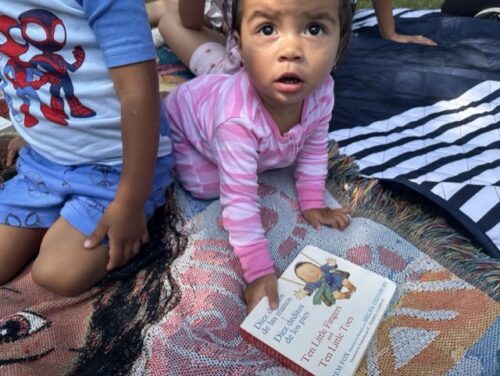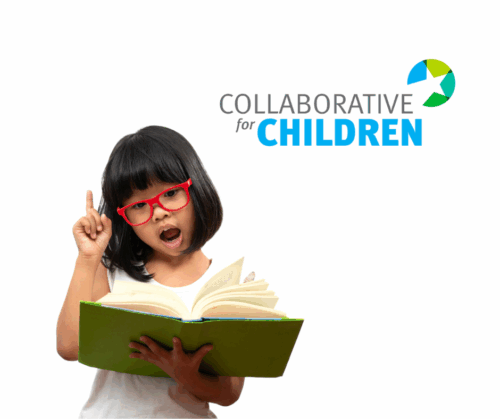
Before a child ever opens a textbook, their brain is already hard at work. From bedtime stories to naming objects at the grocery store, early literacy begins with everyday moments. At Collaborative for Children, we believe these moments matter and we help families and educators turn them into powerful learning experiences.
Emergent literacy is the stage when children begin to understand language, books, and communication; even before they can read or write. It’s the foundation for school readiness, and it starts at home, in child care centers, and in the community.
Children who develop strong literacy skills early are more likely to succeed in school, graduate, and thrive in their careers. But disparities persist:
– Only 35% of preschool children from low-income families are proficient in early literacy.
– Children who are read to regularly at age 3 are 80% more likely to read independently by age 6.
– Early literacy skills are strong predictors of academic success, with a correlation coefficient of 0.75.
That’s why Collaborative for Children focuses on certified early childhood education (ECE), STEAM-integrated learning, and family engagement to close the gap and give every child a fair start.
We blend Science, Technology, Engineering, Arts, and Math (STEAM) with language development. Whether children are building towers, exploring nature, or drawing pictures, they’re learning to express ideas, ask questions, and think critically.
For families in underserved areas, our Collab-Lab mobile classroom brings expert-led learning directly to neighborhoods. This mobile unit offers hands-on activities, parent education, and access to proven programs that support early literacy and school readiness.
By Kimberly Derting and Shelli R. Johannes, illustrated by Joelle Murray
Vivi is a curious young girl who explores tide pools and ocean life during a class field trip. This book introduces basic science concepts and encourages children to ask questions and explore the world around them.
By Ann Marie Stephens, illustrated by Jenn Harney
Nine adventurous kittens go on a boating trip that turns into a hilarious math lesson. This playful story introduces the concept of patterns, making it a great early math read.
By Sue Fliess, illustrated by Petros Bouloubasis
Princess Pippa uses the scientific method to solve a royal problem—how to make peas taste better! This story blends fairy tale fun with real-world science skills
By JoAnn Early Macken, illustrated by Stephanie Fizer Coleman
A gentle, poetic celebration of how children and animals grow. This book supports early literacy through rhythm and repetition while reinforcing themes of individuality and development.

By Eric Litwin, illustrated by James Dean
A classic favorite for preschoolers, this book uses repetition, rhythm, and color recognition to build early reading skills. Pete’s positive attitude also teaches resilience and flexibility.
Whether you’re a parent, educator, or community leader, you can help children grow through literacy:
– Enroll in a Child Care Center of Excellence
– Use our certified ECE curriculum at home
– Bring the Collab-Lab to your neighborhood
– Support our mission through donations or volunteering
Parents can promote reading readiness by talking with their child, reading together daily, singing songs, and asking open-ended questions. These everyday moments build vocabulary and comprehension.
Early literacy predicts future academic success. Children who read proficiently by third grade are far more likely to graduate high school and pursue higher education.